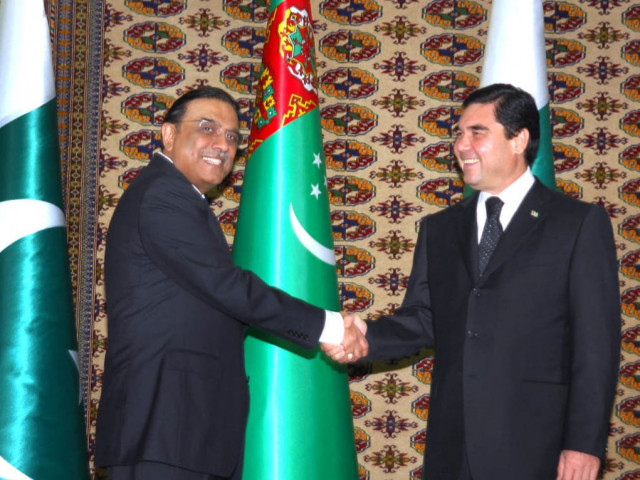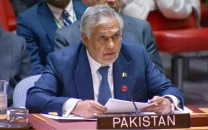Key milestone reached on TAPI gas pipeline
Turkmenistan leader to discuss TAPI project which the US is pushing Pakistan to adopt instead of Iran's gas pipeline.

The two countries signed a total of five agreements and memoranda of understanding (MoUs) at the Prime Minister’s House on Monday.
Visiting Turkmenistan President Gurbanguly Berdimuhamedow, who earlier held a meeting with President Asif Ali Zardari, witnessed the agreements’ signing ceremony along with Prime Minister Yousaf Raza Gilani.
GSPA is a follow-up of the “inter-governmental agreement” (IGA) signed by President Zardari, Afghan President Hamid Karzai, President Berdimuhamedov and Indian Petroleum Minister Murli Deora in the capital of Turkmenistan, Ashgabat, on December 11, last year.
The agreement on gas sales purchase relating to the TAPI gas pipeline project was signed by Managing Director of Inter-State Gas System Mubeen Saulat and Chairman of Turkmenistan Gas Trade Concern Amanali Hanalyev.
What is the TAPI gas pipeline project?
Under the proposed project, the 1,680 kilometre-long gas pipeline, backed by the Asian Development Bank, will bring 3.2 billion cubic feet of natural gas per day (bcfd) from Turkmenistan’s gas fields to Multan and end at the northwestern Indian town of Fazilka.
Under the agreement, Afghanistan’s share will be 500 million cubic feet per day (mmcfd), Pakistan’s share will be 1,325 mmcfd and India’s 1,325 mmcfd.
The demand for natural gas in Pakistan has increased by almost 10 per cent annually from 2000-01 to 2007-08, reaching around 3,774 mmcfd, against the total production of 3,200 mmcfd.
According to the petroleum ministry, the demand in 2008-09 soared to 4,731 mmcfd cubic while production was 4,528 mmcfd cubic, indicating a shortfall of 203 mmcfd.
The TAPI project was initially designed to provide Turkmen gas to Pakistan through Afghanistan in an agreement signed in Islamabad in May 2002, and was known as the Turkmenistan-Afghanistan-Pakistan pipeline project. India was invited to join in, in April 2008.
Pakistan’s cabinet gave approval to the Gas Pipeline Framework Agreement (GPFA) for the TAPI gas pipeline project in its meeting on October 27, 2010.
According to the initial plan, the gas pipeline was to run alongside the Herat-Kandahar Highway in Afghanistan and pass through Chaman, Zhob, DG Khan and Multan in Pakistan.
Turkmenistan has the fourth largest proven gas reserves in the world.
Zardari- Berdimuhamedov meeting
During the meeting between President Zardari and President Berdimuhamedov, the two sides agreed to start direct air-links. Briefing the media, Presidential Spokesperson Farhatullah Babar said that President Zardari expressed satisfaction over the current progress of the TAPI gas pipeline project and called for ‘early realisation’ of the project.
Babar added that the president also proposed that the two countries may enter into a currency swap agreement, preferential tariff arrangement and a free trade agreement to further enhance bilateral trade and investment ties.
The other four agreements and MoUs signed by the two sides were related to cooperation between the countries’ foreign ministries, agreement on cooperation between the Associated Press of Pakistan (APP) and the Turkmen News State Service, an MoU on cooperation between Pakistan’s Ministry of commerce and Ministry of Trade and Foreign Economic Relations of Turkmenistan and an MoU on cultural cooperation.
According to the PM House, during his meeting with Gilani, the Turkmen president said that his country was ready to export 1,000 MW of electricity to Pakistan, as well as gas from a newly discovered gas field, which shares geographical proximity with Pakistan.
Published in The Express Tribune, November 15th, 2011.



















COMMENTS
Comments are moderated and generally will be posted if they are on-topic and not abusive.
For more information, please see our Comments FAQ